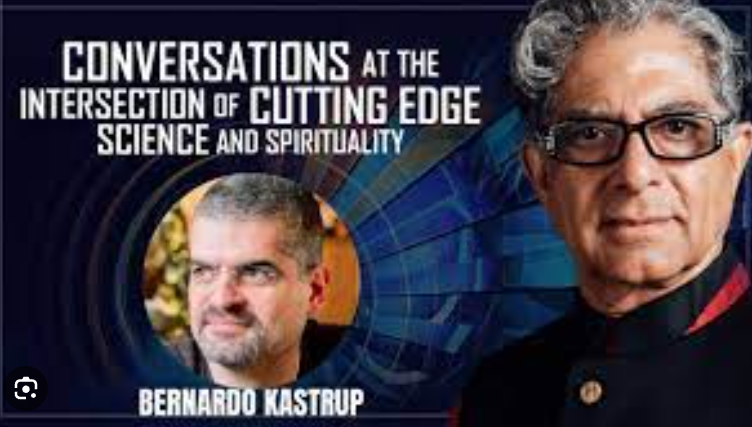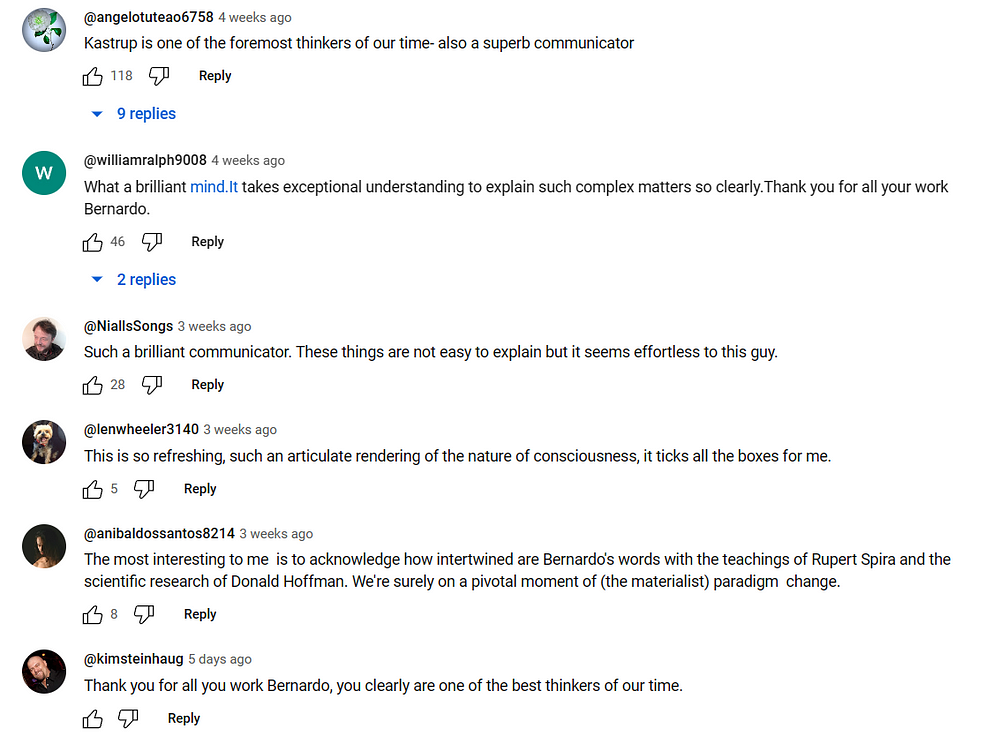
The word “tribal” is used in the title above partly because many self-described “spiritual” people themselves have used the word “tribe” about the “communities” they belong to. [See here.]
As for the word “abusive”. I doubt that such spiritual people could ever admit that they were abusive to opponents, and to those they disagree with. In addition, I’m not offended by the abuse. The abuse is simply something which I’ve noted. And I probably wouldn't have noted it at all if it hadn’t come from those people who see themselves as spiritual.
The level of abuse, tribalism, and even viciousness I’ve received in response to my last essay on Bernardo Kastrup (‘Bernardo Kastrup: ‘The brain does not generate the mind.’’) is telling. This is ironic really because in that essay I wrote the following words:
“The screenshot above is a reply to the YouTube interview on which this essay is based. Indeed, virtually all the replies under the video take on this form. In other words, there isn’t a single criticism of Bernardo Kastrup’s views to be found there. (There isn’t even a reply that’s mildly questioning.) This mass uniformity almost never occurs with other YouTube videos on philosophical issues.”
[See note at the end.]
The responses to my ‘Bernardo Kastrup: ‘The brain does not generate the mind.’ also display such uniformity, as well as aggression and tribalism.
This is odd because spiritual idealists and self-described “spiritual” people make a very strong effort to distinguish themselves from what they deem to be “conventionally” (or “traditionally”) religious people. [See ‘Spiritual but not religious’.] Yet, if anything, these spiritual people often come across as fundamentalists…
So perhaps they should be called spiritual fundamentalists.
In any case, these spiritual people replicate so much of the verbal behaviour which they’re supposed to be against when it’s displayed by traditionally or conventionally religious people.
Thus, there’s a dissonant clash between the self-image of many of these spiritual people… and the reality of who they are, how they behave, and what they actually say.
Of course, this conclusion is hardly original.

Much has been written on, for example, “spiritual narcissism”, Deepak Chopra’s various money-making endeavours (see link directly below), the huge egos of “spiritual leaders” and even their followers (which hide under an image of “selflessness”), spiritual aggression under the guise of peacefulness, spiritual tribalism under the guise of “spiritual universalism”, the exploitation and abuse of “spiritual” consumers and customers, etc.
[See ‘Deepak Chopra Is Selling $350 Meditation Glasses. Deepak Chopra Is A Fraud’ on Medium.]

On “spiritual narcissism” specifically.
It’s worth quoting something from the many publications on this subject. Hopefully, this will help put Bernardo Kastrup and some of his disciples and defenders in context.
The following words are from a piece called ‘Spiritual Narcissists’:
“Spiritual narcissists boast about their spiritual accomplishments [] Just as narcissists believe that they are better than everyone else, spiritual narcissists believe that their spiritual wisdom and development is superior to others’. Spiritual narcissists boast about their spiritual or religious endeavors, including practices such as yoga, prayer, meditation, or knowledge of spiritual texts. Their presumption of superiority leads them to treat others with condescension. They manipulate others through twisting faith-based tenets, belief systems, or wield ‘forgiveness’ as a weapon with those who question their beliefs.
“[] They may try to proselytize their friends and encourage them to join their practice or they may castigate others for their lack of self-awareness and enlightenment. Spiritual narcissists construct a barrier between those who ‘know the way’ and those who refuse to ‘follow the path.’ Just like any narcissist, they are consistently working to set themselves apart from everyone else and see themselves as existing on a level that no one else can easily attain.
“Spiritual narcissism is based on the ego driving the practice as a false means of achieving spiritual superiority.”
In Bernardo Kastrup’s case, he doesn’t only believe that he’s “spiritually superior”: he believes that he’s intellectually, politically and morally superior too.
And all this — and much else — has led me to conclude the much idealism is in fact religious in nature. Specifically, Bernardo Kastrup’s own idealism is a religion.
Yet this shouldn’t be a surprise because many idealists themselves have explicitly tied their own work to religion. (Such people just don’t usually tie their idealism/s to Christianity or to “Western monotheism”.)
Anyway, here are some passages from the response section to my essay.
Bernardo Kastrup’s Defenders

Firstly, here’s someone called Cosmic Keith:
“This whole thing, the article and your responses, read like a mash of unclear complaints, undirected anger, confusion and rants. I found your ‘analysis’ shallow and lacking any real substance []
“The one position you did convey to me was ‘How dare he say something that I can’t wrap my head around and I am just totally buggered and lashing out to diminish a challenge to my underlying suppositions!’ ‘Blah blah blah, (ego protective mechanisms). He’s just wrong! See!?’
“[] And the ranting continues. Sure you will issue the same kind of response to this comment.
“My first thoughts while reading your article were: has the author bothered to dive more deeply into Kasteups positions or did he just watch one YouTube, feel offended and try to dutifully issue a takedown article to protect his now scrambled thought-stream?
“And my second thought was : where the hell is this going?
“Down, down, to Nowhere… fast.
“It’s odd-funny to read articles (poorly formed opinion pieces) in defense of Physicalist/Materialist ideology that triy to be reasoned and rational but are just temper tantrums arise from lack of contemplation (?) …or understanding(?). And when others point out the incoherency, the autbors just lash out, and further the impression that it is indeed a tantrum…
In the defense of ‘scientific’ philosophical axioms that those authors don’t appear to have examined, or even be aware that their thinking is operating from. (wholesale ideologcal adoption)”
Oddly enough, the passage above is a philosophy-free version of some of the subjects that Bernardo Kastrup himself has actually written on. Indeed, the defenders (or disciples) of Kastrup actually replicate Kastrup’s frequent use of abuse, as well as his disturbing Manichean worldview. (This is a worldview which is not only aimed at what Kastrup calls “materialists”.)
Another fan of Kastrup (a Øystein Haltbakk) offered his readers these words about a previous essay I’d written on Kastrup:
“The author provides a compelling example of the consequences that may arise when the unconscious facets of one’s personality diverge from the ego ideal. However, it’s possible that the author is unaware of this dynamic.”
I mentioned the fact that the response from Cosmic Keith above tackles the same targets as Kastrup, but his prose style is very much unlike Kastrup’s own. However, this response from Øystein Haltbakk is almost identical to both the style and the content of Kastrup’s own prose.
In any case, let’s now take some examples from Kastrup himself.
Let’s start with the most recent one I’ve come across, written by Kastrup in October 2023:
“[Tim] Maudlin’s unbecoming, unacademic and rude behaviour made it clear that such was not the case. He came across to me as a nasty and crass street brawler, not a thinker. [] Nor do I find his ungrounded, tendentious, hand-waving and wishful technical statements worthy of in-depth discussion in debate format. I am sure he can continue to believe in his unfalsifiable, pseudo-scientific fantasies without my help.”
[See Kastrup’s own ‘My unfortunate attempt at debating Tim Maudlin’. Tim Maudlin is a philosopher of science.]
And now there’s the following examples:
“Dim-witted biologist [].”
[This is a reference to the biologist Jerry Coyne.]
“ [] Sabine [Hossenfelder] has a big mouth and seems to be willing to almost flat-out lie in order to NOT look bad when confronted on a point she doesn’t have a good counter for. [] Her rhetorical assertiveness is, at least sometimes, a facade that hides a surprising lack of actual substance.”
“What makes the profound ignorance betrayed by the ‘review’ even worse is the conceitedness and pretentiousness that oozes through it.”
“How can a magazine with ambitions to ‘promote scientific inquiry, critical investigation, and the use of reason’ publish this kind of juvenile garbage?”
“Since he [Philip Goff] was a cosmopsychist just a couple of years ago, then a constitutive panpsychist for the duration of one book, and now seemingly something else already again, who knows what his position will be by the time we debate?”
“[] there is little of substance in [Massimo] Pigluicci’s essay to actually rebut or respond to. [] Unlike Pigliucci, I shall comment based on substance. Yet, I shall also comment vigorously and honestly, not through a smokescreen of passive aggression.”
“Many academic philosophers love to indulge in these tortuous conceptual games that achieve lift off from the firm ground of reality and end up in some other galaxy. This is no news. But I confess to feeling disappointed at Philip [Goff], an academic philosopher I thought would see through this nonsense. I regret that so much energy and time was wasted, during the debate [].”
“I am not doing this just to gratuitously and repeatedly stick my finger in the wound; I’m not trying to do character assassination. But during the debate [Sabine] Hossenfelder attempted (and probably succeeded, in the eyes of many viewers) to make me look like an ignorant fool by flat-out misrepresenting her own output. I ought to defend myself against that overt suggestion, which I consider to have been rhetorical and dishonest, violating all basic debate ethics.”
“Again, [Sam] Harris seems to be, at best, confused and ignorant of the facts; or, at worse, wilfully biased in his appraisal of the available data. [] The irony would be sweet if it weren’t concerning as far as what it seems to say about Sam Harris.”
“[S]ome seem to react to what I have accomplished with covetousness — as opposed to the objectivity that academics are expected to embody — is both a serious problem and a missed opportunity for desperately-needed change. [] Many academic philosophers have abandoned reality and now spend their time playing entirely abstract conceptual games of no relevance to you and me. But they still insist that what they do is ‘real’ philosophy. []”
“And [Daniel] Dennett isn’t alone. Others, like psychologist Nicholas Humphrey, suggest the same thing [] Despite being a surreal display of in-your-face incoherence, the fact that the video is cladded with the gentle and trust-inspiring demeanor of an affable old man [].”
“There is a significant way in which fundamentalist atheists may be unconsciously attributing to others their own cognitive limitations. In psychological terms, this is called a projection. By passing judgment onto their own projections according to the rules of their own private games, they reveal parts of their psychological makeup but assert nothing of relevance about the nature of reality.”
“[W]hat kind of psychological disposition makes one feel entitled to publicly criticize something one has admittedly not understood?”
“This is one of those embarrassing passages in which Jerry Berry [Jerry Coyne] unwittingly makes painfully clear to the whole world the depths of his philosophical ignorance.”
“[Keith] Frankish has accomplished precisely nothing in his long essay; at least nothing more than tortuous obfuscation and hand-waving.”
Oddly enough, one of Kastrup’s defenders (a Greg Sotiropoulos) defended Kastrup with these words:
“Now show us where exactly the persons, rather than their ideas, were attacked?
1. ‘babble incoherently’: not AH [ad hominem]; he’s talking about the incoherence of the babble
2. all the ‘emperor has no clothes’ quotes — how exactly are the people attacked? Can you explain what exactly constitutes an AH here?
3. ‘heir [Graziano and Frankish] nonsense is toxic, corrosive and pernicious’: again, it’s their nonsense that is judged/attacked, not the people.[]
“I scrolled down to the end of the article thinking that there might be something there, but still no luck. The closest I could find is ‘unwittingly makes painfully clear to the whole world the depths of his philosophical ignorance’
but that’s still not an AH.”
Greg Sotiropoulos’s point is that Kastrup didn’t actually use any ad hominems. Technically, perhaps Sotiropoulos is right. However, what would he call Kastrup’s rather obvious abuse of other people? (I suspect Sotiropoulos would have a problem with my word “abuse” too.) And whatever Sotiropoulos calls these words and phrases, he certainly defends what Kastrup says.
In any case, here are some much-milder responses to my ‘Bernardo Kastrup: ‘The brain does not generate the mind.’’ essay.
The following is from Prudence Louise:
“I read the whole article and still don’t know what your point is.”
In most cases, when people use the phrase, “I don’t know what your point is” (as well as variations on it), they really mean this: I don’t like your point. (In other words, the phrase “What is your point?” is rhetorical.) This was especially true of Prudence Louise since she then went straight ahead and told me — along with other readers — what she took my point to be. And then she gave many reasons as to why she didn’t like my supposed singular point.
As it is, Prudence Louise never quoted — or even paraphrased — a single syllable from my actual essay. She simply told readers why she doesn’t like materialists, and why she doesn’t agree with materialism.
So here’s some more (tribal) uniformity from Mark D Rego:
“I must agree with Prudence below. There is a lot of rambling.”
Mark D Rego then admittedly moved away from stating that I ramble, to stating that the “worlds” of materialist scientists are “about to crumble”. In full:
“[] Deep down I hope Kastrup is right about most things. [] The youngish scientists are soooo sure it’s not this way. We have it all almost figured out they believe. They do not know that their worlds are about to crumble. The biological consensus is falling apart. We are not wet robots but something else entirely. []”
Now that passage really does sound like religious prophesy.
Bernardo Kastrup’s Disciples

Finally, here are some replies under the video (called ‘‘Your Consciousness is Not in Your Head.’ | Interview with BERNARDO KASTRUP, PhD’) I actually wrote my essay on:
“I feel something akin to spiritual bliss whenever I listen to the words of Bernardo Kastrup.”
— Patrick Thompson
“Bernardo is orders of magnitude beyond brilliant.”
— Kim M. Clark, OD
“Absolutely marvellous expose of this gentleman. It lifts a veil from our eyes. Very coherent.”
— kosmotrekker
“It’s a feeling of quite some ecstasy when someone of academic renown says what you, as a mere spectator, also intuit with great depth. This guy seems to ‘know’ what I merely sense. [].”
— Fathom
“What a brilliant mind. [] Thank you for all your work Bernardo.”
— William Ralph
“Wow. I love this guy. I wonder does he realize this view resolves the paradox of free will vs determinism.”
— Fathom
“Bernado!! You nail it every time!”
— Paul Garrett
“One day, I would like to meet this brilliant man. He knows many many things.”
— Ginevra J De Luca
“Bernardo is a. Intellect personified.”
— Sharpo
“I live in a place called Kastrup….this is weird…”
— Bugzy Hardrada
“Bernardo is the Galileo of Consciousness in my humble and insignificant opinion.”
— Michael Dillon
“Thank you for all you work Bernardo, you clearly are one of the best thinkers of our time.”
— Kim Steinhaug
What Kastrup’s Disciples Believe

The following are some replies (under the same YouTube video) which don’t actually mention Kastrup himself, but they’re informative anyway:
“The status quo have deliberately repressed what Buddhist teachings have know for over 2500 years that the universe is itself a conscious field of energy we experience the universe through our self awareness.”
— Pi 3 times 14 is 42
“well if you implicate his philoshopy ot fullest degree, actualy he is saying that we are center of universe. That would be shown if you ask him what happen after consciousness is dissociated from body. On the other hand, fact that we are eternal individual localized consciousness has far rich implication.”
— AntimaterialWorld
“I would love to believe consciousness is always there and our brains tap into the infinite consciousness and when our lives end we use this consciousness again maybe in another dimension or as a reincarnate? But it sounds like no one really dies.”
— Benedetto Salerno
“I am the holy ghost…. science meets spirit… one begets the other, about time :)”
— stevefrompolaca
“Sure psychedelics are incredible tools. I recommand 1P-LSD which is still legal in some countries like Netherland (1/2 a blotter is enought to shake your mental ground). I still listening again and again BK to understand in depth all his odd ideas. Peace & love Thanx for the video.”
— 1sanremy
“Can this be the reason why everyone that has died never gets to come back to the Earths state of consciousness but are using this infinite consciousness in another realm still living on.”
— Benedetto Salerno
“In other words, Vedanta (Hinduism).”
— J S
“In translation — we are immortal spiritual beings who wear this meat suit for some time.”
— Petar Lukovic
“Your Matrix is in Your Head. It makes everything look separate. In reality, the universe is one entity.”
— apparent being
“We are all mental manifestations in the mind of The All.”
— Hermes.T
Note:
(1) I must now amend that passage. When I went back to this reply section under the video interview with Bernardo Kastrup, I did find a 2 or 3 critical replies — among dozens of obsequious ones.
Perhaps the main reason why Kastrup does so many interviews (most of which can be found on YouTube) is in order to build up his own cult following. He has succeeded in that task, as the quoted replies show.









No comments:
Post a Comment